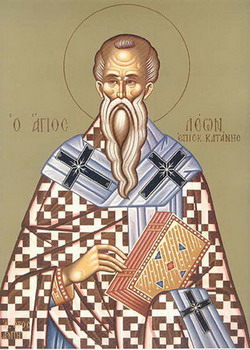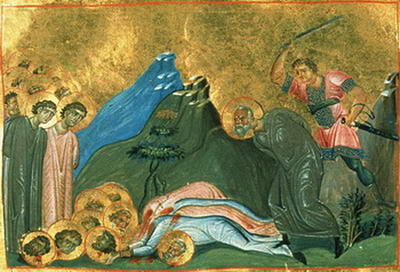|
|
St Leo, Bishop of Catania Beneath Mount Etna the volcano, in the town of Catania, St Leo was a good shepherd and compassionate teacher of the people. He had great care for the sick and poor, and both his zeal for the Faith and his compassion for the needy were great. There appeared one day in that town a magician called Heliodorus, who deluded the people with many illusions and greatly seduced the young. He once entered a church during divine service and began his tricks. St Leo came up to him, bound him with one end of his pallium and led him out to the market place. There he ordered that a great fire be kindled. When it was burning fiercely he stood among the flames and pulled Heliodorus to him. Heliodorus was completely burned up, but Leo remained alive and unharmed. All who had been taken in by Heliodorus, and who had regarded him as in some way divine, were put to shame by this. The compassionate and zealous Leo became known throughout the whole kingdom as a wonder-worker, helping people by his miracles. When he had finished his course, some time in the 8th century, his soul went to the Lord and healing myrrh flowed from his relics. Beneath Mount Etna the volcano, in the town of Catania, St Leo was a good shepherd and compassionate teacher of the people. He had great care for the sick and poor, and both his zeal for the Faith and his compassion for the needy were great. There appeared one day in that town a magician called Heliodorus, who deluded the people with many illusions and greatly seduced the young. He once entered a church during divine service and began his tricks. St Leo came up to him, bound him with one end of his pallium and led him out to the market place. There he ordered that a great fire be kindled. When it was burning fiercely he stood among the flames and pulled Heliodorus to him. Heliodorus was completely burned up, but Leo remained alive and unharmed. All who had been taken in by Heliodorus, and who had regarded him as in some way divine, were put to shame by this. The compassionate and zealous Leo became known throughout the whole kingdom as a wonder-worker, helping people by his miracles. When he had finished his course, some time in the 8th century, his soul went to the Lord and healing myrrh flowed from his relics.The Hieromartyr Sadok Sadok was bishop in Persia after St Simeon. One night St Simeon appeared to him in a dream and said: "Yesterday, me; today, you!" Sadok interpreted these words to his congregation as meaning: "Last year I suffered; this year you will." And indeed, in that year, King Sapor arrested him with many of his clergy and people and brought them to trial. He first ordered them to worship fire and the sun as divine. Sadok replied: "We are ready with all our hearts to die for our God, and will not worship fire or the sun." They were then tortured and condemned to be beheaded with the sword. Before execution, Sadok raised this prayer to God: "Wash us from our sins, 0 Lord, in our own blood", - and Sadok gloriously gave his body to death and his soul to God immortal, together with his priests and his people. He suffered in 342 or 344. Sadok was bishop in Persia after St Simeon. One night St Simeon appeared to him in a dream and said: "Yesterday, me; today, you!" Sadok interpreted these words to his congregation as meaning: "Last year I suffered; this year you will." And indeed, in that year, King Sapor arrested him with many of his clergy and people and brought them to trial. He first ordered them to worship fire and the sun as divine. Sadok replied: "We are ready with all our hearts to die for our God, and will not worship fire or the sun." They were then tortured and condemned to be beheaded with the sword. Before execution, Sadok raised this prayer to God: "Wash us from our sins, 0 Lord, in our own blood", - and Sadok gloriously gave his body to death and his soul to God immortal, together with his priests and his people. He suffered in 342 or 344. |